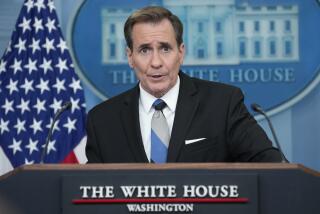U.S., Russia Fail to Agree on Nuclear Cuts
- Share via
WASHINGTON — Secretary of State James A. Baker III and Russian Foreign Minister Andrei V. Kozyrev failed to reach agreement Tuesday on a new level of nuclear weapons cuts, raising the prospect of tough negotiations at next week’s summit meeting between President Bush and Russian President Boris N. Yeltsin.
Both sides have agreed in principle to cut their long-range arsenals by roughly 50% below the limits in last year’s Strategic Arms Reduction Treaty--the quickest deep cut in the history of nuclear arms control. But the deal was held up by disagreements over which missiles should be destroyed and how soon the cuts should occur, U.S. and Russian officials said.
The Bush Administration is asking for elimination of all land-based nuclear missiles with multiple warheads, which U.S. strategists consider the most dangerous in Moscow’s arsenal. But the Russians have resisted eliminating them because they are the core of their nuclear force.
This week, Kozyrev made his first formal proposal to cut multiple-warhead missiles, offering to limit them to about 30% of the Russian nuclear force, U.S. officials said. Now the two sides are considering whether they can find a compromise between the two positions, officials said.
“We will continue these discussions, hopefully over the course of the next several days,” Baker told reporters on the White House driveway after he and Kozyrev reported the results of their talks to Bush.
“There’s a genuine recognition on the part of both countries that we ought to reduce the levels of these weapons . . . as substantially and quickly as possible,” Baker said. “The timing of these reductions and the mix of the reductions are the main elements where there continue to be differences. It’s not enough simply to say reduce weapons; you have to talk about what kind should be reduced.”
“We have a much better understanding of each other’s positions now,” Kozyrev replied, “and we’re sure that we will be able to arrive at closure on this.”
He added a plea for quick agreement on his own terms.
“We do not need those arms, and we are not going to use them against the United States,” he said. “The real challenge here is finding out just how we dismantle this war machine that has been created over the past 40 years.”
Negotiators should be wary of blocking a good agreement by holding out for a better one, he said. “The real question here is not to turn the better into the enemy of the good.”
Critics of the Administration position--including some State Department officials who spoke unofficially--echoed that argument, suggesting that the United States should accept the cuts now being offered and negotiate for further cuts later.
A senior Administration official confirmed that the Defense Department has insisted on maintaining the U.S. demand for elimination of multiple-warhead missiles “because those are the most destabilizing weapons.”
Another official said Bush and his aides are now considering whether to soften that demand and accept a compromise that would allow the Russians to keep some multiple-warhead missiles.
White House aides still hope a deal can be concluded by the end of Yeltsin’s meetings in Washington next Tuesday and Wednesday, in part because it would give Bush a new foreign policy success to cite in his reelection campaign.
“If we can reach an agreement between now and next week, that’s fine,” one official said. “If it takes President Bush to wrap it up (during Yeltsin’s visit), that’s fine too.”
As signed last July, START would require the United States to reduce its arsenal to about 9,000 nuclear warheads and Russia to about 7,000 over seven years.
The new agreement under discussion would require each country to cut the weapons to a total of no more than 4,700 each during the same period.
More to Read
Sign up for Essential California
The most important California stories and recommendations in your inbox every morning.
You may occasionally receive promotional content from the Los Angeles Times.











